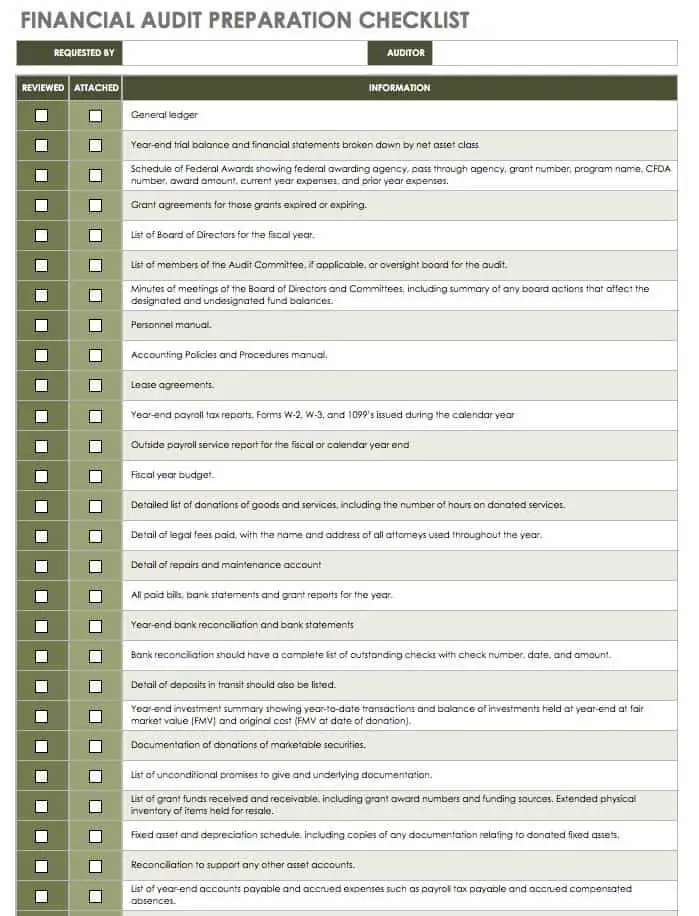Preparing for a financial audit can seem overwhelming, but with the right approach, it doesn’t have to be. So, how to prepare for a financial audit? The key is to be organized, thorough, and proactive. By implementing a few strategic steps, you can ensure a smooth and successful audit process. In this article, we will guide you through the essential tasks and best practices to effectively prepare for a financial audit. Let’s dive in and make the audit process less daunting.
How to Prepare for a Financial Audit
Introduction
Preparing for a financial audit can be a daunting task, but with the right approach and attention to detail, you can ensure a smooth and successful audit process. In this article, we will walk you through the steps you need to take to prepare for a financial audit. From organizing your financial records to conducting internal audits, we will cover all the essential aspects of preparing for an audit. So, let’s dive in!
Gather and Organize Your Financial Records
Before the auditors arrive, it’s crucial to gather and organize all your financial records. This step creates a solid foundation for the audit process and ensures that everything is readily accessible for the auditors. Here are some tips to help you with this process:
- Create a checklist of all the financial documents you need to gather, including balance sheets, income statements, cash flow statements, tax returns, bank statements, and more.
- Arrange your documents in a logical order, making it easy for the auditors to review and verify the information.
- Ensure that all your financial records are up to date and accurate. Keep track of any adjustments or changes made during the accounting period.
- Consider using digital tools or accounting software to organize your financial records more efficiently. These tools can help streamline the process and reduce the chances of errors or inconsistencies.
Review Internal Controls
As part of the audit preparation, you should review your internal controls to ensure they are functioning effectively. Strong internal controls provide safeguards against fraud, errors, and other financial misstatements. Here’s what you can do to review and strengthen your internal controls:
Assessing Risks and Segregation of Duties
- Identify potential risks and vulnerabilities in your organization’s financial processes. This may include risks related to cash handling, inventory management, or financial reporting.
- Review the segregation of duties within your organization. Ensure that no single individual has complete control over a financial transaction from start to finish.
- Implement proper authorization and approval protocols for financial transactions. This helps maintain accountability and reduces the risk of unauthorized transactions.
Documenting Policies and Procedures
- Document all your financial policies and procedures in a clear and concise manner. This documentation should include details about your organization’s accounting principles, financial reporting standards, and any specific guidelines relevant to your industry.
- Regularly update these policies and procedures to reflect any changes in regulations or industry best practices.
Performing Internal Audits
- Conduct regular internal audits to identify any potential issues or discrepancies in your financial processes.
- Assign trained staff members or hire external auditors to perform these internal audits.
- Document the findings and implement corrective actions to address any identified deficiencies.
Communicate with the Audit Team
Effective communication with the audit team is crucial for a successful audit process. Here’s how you can ensure clear and transparent communication:
Appointment of an Audit Liaison
- Appoint a designated person within your organization to act as the point of contact for the audit team.
- This audit liaison will facilitate communication and coordinate the audit process, ensuring that the auditors have access to all the necessary information.
Provide Access to Information
- Ensure that the audit team has easy access to all relevant information and documents. This includes providing them with remote access to your financial systems and any necessary login credentials.
- Address any questions or requests for additional information from the audit team promptly and efficiently.
Schedule Regular Meetings
- Set up regular meetings with the audit team to discuss the progress of the audit and address any issues or concerns.
- These meetings can help keep everyone on the same page and ensure a smooth audit process.
Prepare for Fieldwork
Fieldwork is the phase of the financial audit where the auditors physically visit your organization to conduct their review. To ensure a seamless fieldwork experience, you should:
Designate a Comfortable Workspace
- Set up a designated workspace for the audit team with access to the necessary resources, such as power outlets, internet connectivity, and a suitable working environment.
Provide Required Facilities
- Ensure that the audit team has access to necessary facilities like restrooms, meeting rooms, and refreshments during their fieldwork.
Be Available for Queries
- Be available on-site to address any queries or requests from the auditors during fieldwork.
- Provide them with the necessary support to complete their review efficiently.
Preparing for a financial audit requires careful organization, internal control review, and effective communication. By following the steps outlined in this article, you can ensure a smooth and successful audit process. Remember, thorough preparation and attention to detail are key to a hassle-free audit experience. So, take the time to gather and organize your financial records, review internal controls, communicate with the audit team, and prepare for fieldwork. By doing so, you’ll be well prepared to navigate through the audit process and achieve compliance with financial reporting standards.
Now, it’s time to put these steps into action and start preparing for your financial audit!
How to audit financial statements | FloQast
Frequently Asked Questions
Frequently Asked Questions (FAQs)
How do I prepare for a financial audit?
To prepare for a financial audit, follow these steps:
What documents should I gather for a financial audit?
Gather the following documents for a financial audit:
– Income statements
– Balance sheets
– Cash flow statements
– Bank statements
– General ledger
– Payroll records
– Invoices and receipts
– Tax returns
What should I do to ensure accurate financial records?
To ensure accurate financial records, you can:
– Maintain organized and up-to-date bookkeeping
– Reconcile bank statements regularly
– Implement strong internal controls
– Conduct regular audits or reviews
– Seek professional assistance if needed
How can I review my internal controls before an audit?
To review your internal controls before an audit, consider the following steps:
– Evaluate your organization’s control environment
– Assess the risk management process
– Review the control activities in place
– Verify if there are proper information and communication channels
– Evaluate the monitoring procedures
What are common mistakes to avoid during a financial audit?
Common mistakes to avoid during a financial audit include:
– Failing to maintain proper documentation
– Ignoring internal control weaknesses
– Not reconciling accounts on a regular basis
– Overlooking or misclassifying expenses
– Inadequate segregation of duties
– Not addressing prior audit findings
Should I hire a professional auditor for my financial audit?
Hiring a professional auditor for your financial audit is highly recommended. A professional auditor brings expertise, objectivity, and independence to the process, ensuring a thorough and unbiased assessment of your financial records.
How long does a financial audit typically take?
The duration of a financial audit depends on various factors such as the size of the organization, complexity of transactions, and the scope of the audit. Generally, a financial audit can take anywhere from a few weeks to several months.
What can I do with the findings of a financial audit?
Once you receive the findings of a financial audit, you can use them to:
– Identify areas of improvement
– Strengthen internal controls
– Make informed business decisions
– Address any issues or discrepancies discovered
– Enhance transparency and accountability in financial reporting.
Final Thoughts
Preparing for a financial audit is a crucial task for any business. To ensure a smooth and successful audit process, there are key steps you must take. First, gather and organize all relevant financial documents, such as income statements, balance sheets, and bank statements. Next, conduct a thorough review of your financial records to identify any potential errors or discrepancies. Additionally, implement strong internal controls and procedures to minimize the risk of fraud or misstatements. Finally, communicate and collaborate effectively with your audit team, providing them with all necessary information and addressing any inquiries promptly. By following these steps, you can confidently prepare for a financial audit and demonstrate your commitment to financial transparency and accuracy.



